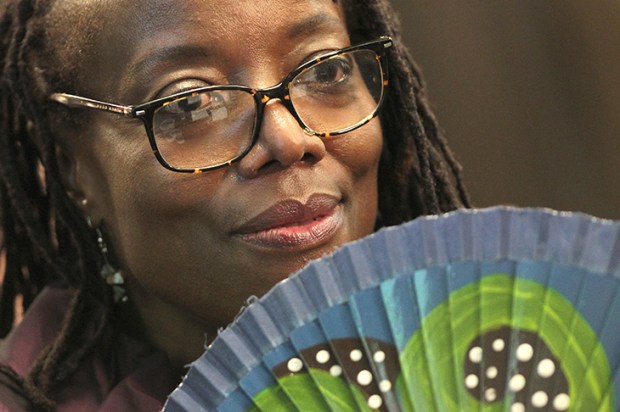Imagine receiving an anonymous suicide note addressed to you by mistake. Would you try to find that person, to help them in some way? This is the opening dilemma in Bernard Minier’s Don’t Turn Out the Lights (Mulholland Books, £14.99), and Christine Steinmeyer’s failure to locate the letter’s sender turns her life in Toulouse upside down. Her dog disappears, she’s accused of harassment at work and her fiancé walks out on her. She believes that someone — some unknown person — is to blame for her misfortunes; but are the threats real, or is Christine losing her mind?
This is a super-accelerated version of a Hitchcock thriller, with thrills and shocks on nearly every page. As the pages zip by, it’s easy to picture Minier writing at speed to keep pace with Christine’s attempts to find out the truth. Set against this we have Detective Martin Servaz, currently suffering from depression. One day he receives a key to a hotel room in which a young woman killed herself. His investigations bring him closer to Christine, and when he arrives at her house we breathe a sigh of relief: maybe now she will be safe, free from her struggles. Well there’s little chance of that, not in Minier’s desperate, dangerous world. He reels out lurid, quick and dirty prose, dirty enough to blacken the fingers as we read.
The Exiled (Orenda, £8.99) is the latest novel from Finland’s Kati Hiekkapelto. Detective Anna Fekete has returned to her hometown in Serbia for a holiday. When her purse is stolen and the thief is later found dead on a river bank Fekete finds herself up against the local police, who don’t seem all that interested, probably because the victim is a gypsy. More than that, some of the senior officers actually warn her off the case.
This is a murder that grows out of the area, the Hungarian-Serbian border where an increasing number of refugees are setting up camp. But the case takes on a personal edge: is the murder of the thief connected in some way to the death of Fekete’s father back in 1988? The investigation is engaging, carefully put together clue by clue, but the detective’s personality begins to grate. Her invariably ‘correct’ way of thinking makes her a self-righteous bore. She saves her vitriol for anyone who happens to have a different opinion to herself: ‘Jesus Christ, how stupid can people be?’ Liberal in her political views, she’s horrid to people she thinks are beneath her. Such a contrast could well be interesting, but here it just irritates.
Set in 1842, M.J. Carter’s The Devil’s Feast (Fig Tree/Penguin, £14.99) features the private enquiry agents William Avery and Jeremiah Blake. There’s uproar at the Reform Club following the death by poisoning of one of the club’s members. In a few days an important political banquet will take place, raising fears that the murderer is out to disrupt the event. Avery is called in to investigate, and at first he feels well out of his depth in the club’s gilded halls.
Suspicion falls on the kitchen staff, including the head chef, Alexis Soyer, the self-styled ‘Napoleon of food’. Carter takes great delight in describing the dishes on offer, even when any one of them might be laced with strychnine. Blake’s arrival turns up the heat and his more intuitive personality uncovers the fierce rivalries hiding beneath the good manners. We learn much about the workings of the Victorian kitchen and the latest fashions. But there is only so much one can read about paisley cravats, and less description would have left room for more plot and more mystery. But the novel is well written, revelling in the times, the social mores and the deaths: ‘The poor patient stared at us, his eyes full of terror until, with a last convulsion, he expired.’ An enjoyable repast, lacking that final touch of spice in the mix.
Two very different novels join together to form Anthony Horowitz’s Magpie Murders (Orion, £18.99). Editor Susan Ryeland sits down one night with the latest manuscript of the bestselling crime writer Alan Conway. We read this story as she does, following the detective Atticus Pünd in his attempts to solve a murder mystery in the 1955 setting of a quaint English village. But the manuscript’s final chapters are missing, and the murderer is left unnamed. When Conway commits suicide, Ryeland goes off in search of the missing pages, and begins to suspect that the author was himself a victim of murder. The two stories mirror one another, with Ryeland’s enquiries uncovering real-life influences on the murder mystery, and the mystery containing many clues about Conway’s life and his death. The Atticus Pünd story is superbly written, with great suspects, a perfect period feel and a cracking reveal at the end.
Now I don’t mind a few typos in a first edition, but there are some serious errors here: journal entries wrongly dated, characters given the wrong names, and ‘Graham Greene’ even spelt wrong. In a traditional mystery narrative — so dependent on precise details — this is a problem. Luckily, the book’s good enough to win us over despite these mistakes. A relative says of Conway: ‘He used language as a place to hide.’ This is a perfect description of the crime novel’s enduring appeal, and an invitation for us as readers to undertake our own investigations.
The post Crime fiction for Christmas appeared first on The Spectator.
Got something to add? Join the discussion and comment below.
Get 10 issues for just $10
Subscribe to The Spectator Australia today for the next 10 magazine issues, plus full online access, for just $10.
You might disagree with half of it, but you’ll enjoy reading all of it. Try your first month for free, then just $2 a week for the remainder of your first year.














Comments
Don't miss out
Join the conversation with other Spectator Australia readers. Subscribe to leave a comment.
SUBSCRIBEAlready a subscriber? Log in